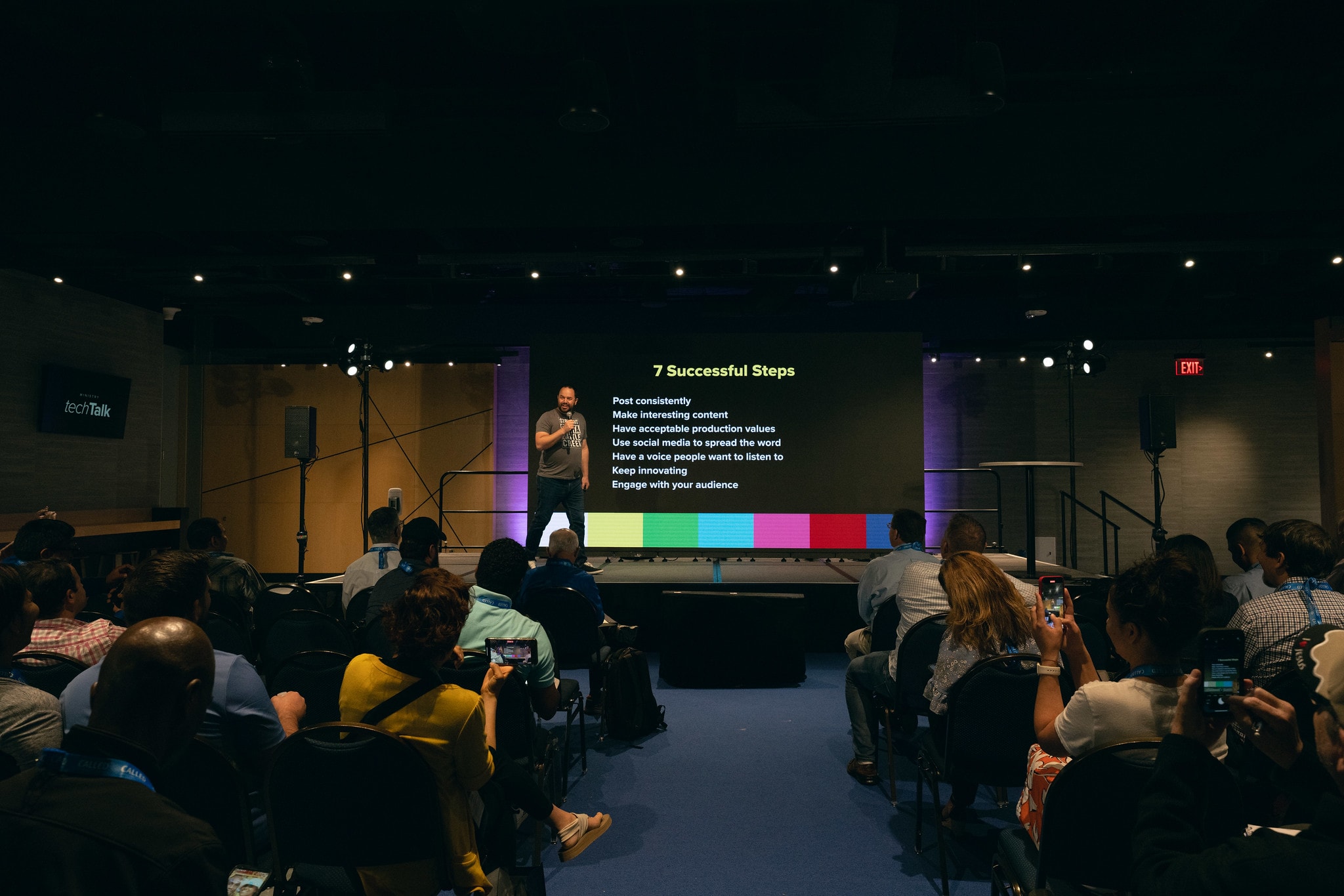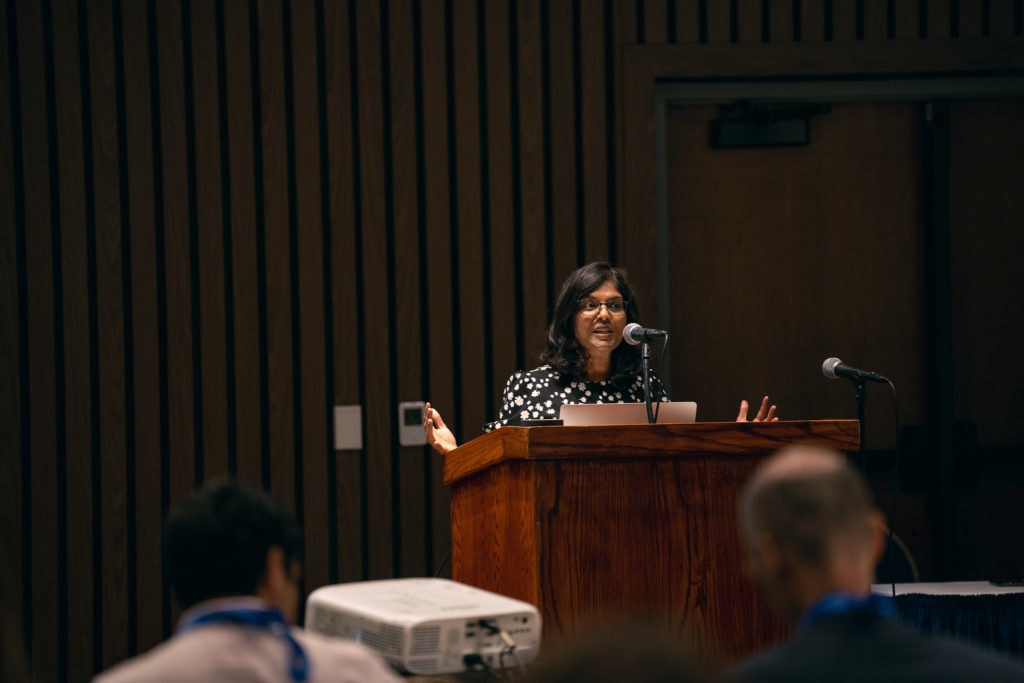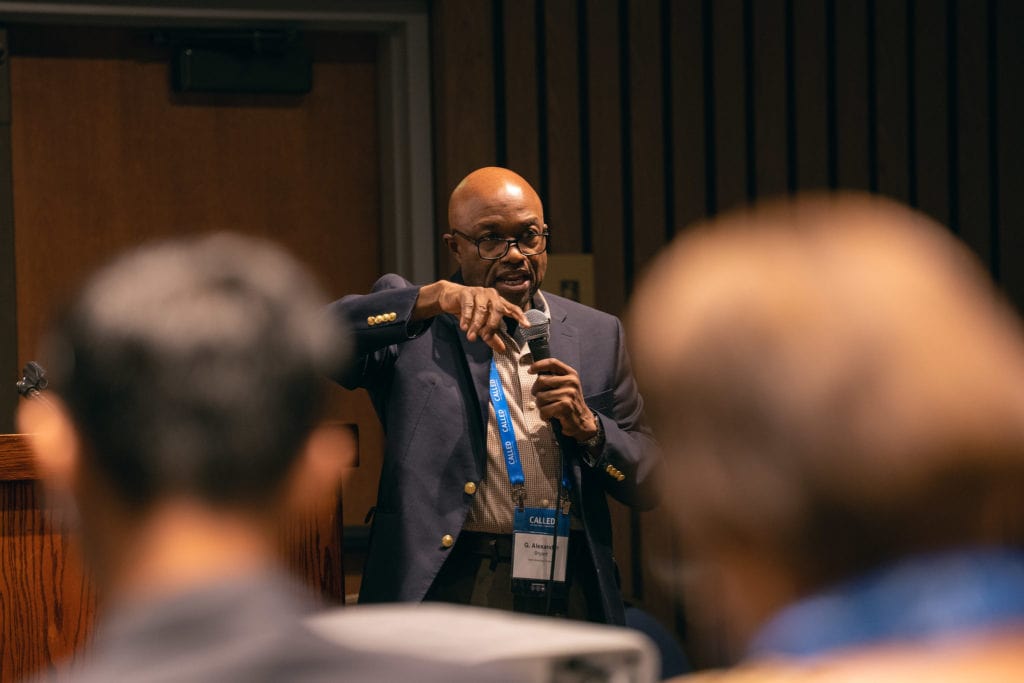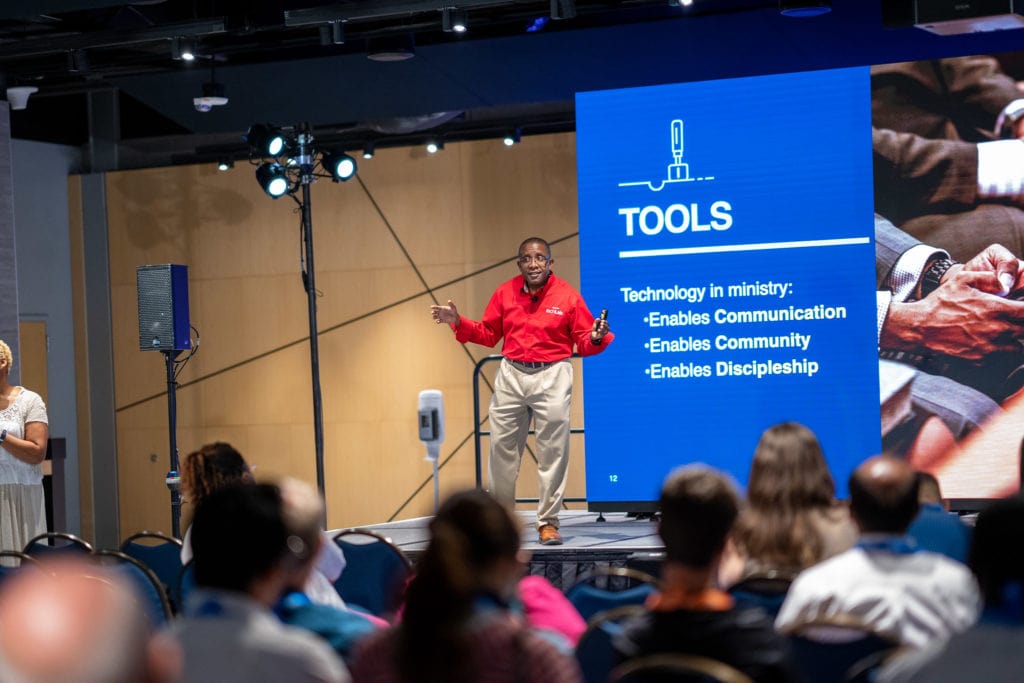
It’s afternoon at the CALLED Pastors’ Family Convention, and the bustling lunch crowd is starting to disperse. A few of the remaining wanderers pause under the bright blue CALLED banner to check today’s schedule of events. Guests who didn’t plan ahead are faced with a choice. Which of the many educational seminars will they attend this time?
Near the sleek, modern tech lab with its tasteful equipment displays, a talk on podcasting is about to begin.
Downstairs, in a spacious film-screening room, Mark Tamaleaa is showing ministry videos and sharing tips from more than two decades in youth and young adult ministry.
And just around the corner in a stately room lined with upholstered chairs, G. Alexander Bryant, president of the North American Division (NAD), is sharing lessons from the story of Paul and Barnabas. “People were afraid of Paul, but then Barnabas said, ‘Come on, Paul. I’m not afraid of you. I’m going to help build up the gift that is in you,’ ” Bryant says as latecomers file in and stand at the back of the room.


Over the course of several days, the 2022 CALLED Pastors’ Family Convention offered 135 educational seminars, with more than 25 simultaneous classes in a single afternoon. Presenters included NAD officers and department directors, health-care professionals, technical innovators, pastors, and experts in a wide variety of fields. The topics were varied, but all were chosen to provide training and tools for pastors and chaplains.
The convention also hosted a series of seminars for pastors’ spouses and created the CALLEDKids Go Fish for Kids meetings for younger children, as well as the PK Journey program for older pastors’ kids.
The NAD Ministerial Association selected a wide range of pastoral learning opportunities based on seven “core qualities of an effective pastor.” These include character, evangelism, leadership, management, relationship, scholarship, and worship. On the convention website, the ministerial team wrote that “effective pastors continually engage in equipping themselves with the current best practices of ministry.”
There were four “bootcamps” — or dedicated seminar tracks — that pastors and ministry teams could attend, either as a complete set or mixed and matched with other topics. The four bootcamps were geared toward (1) church planters, (2) church revitalization, (3) pastor evangelists, and (4) volunteer lay pastors.
“Every church has a culture, whether you like it or not. Yours does. Mine does,” Joanne Cortes, pastor and church planter in the Washington, D.C., area, said during the Pastor Evangelists’ Bootcamp. “Ask yourself: Why do we do what we do? Why does the church exist?” she said. “Does it draw people to Jesus? Does it make people feel welcome? Or is it done because it’s always been done?”
A sampling of the many outreach-based seminars included a class on ministering to the dying, led by Claudio and Pamela Consuegra, director and associate director of NAD Family Ministries; a talk on community care by W. Derrick Lea, director of Adventist Community Services; and advice for welcoming the blind community to church from Christian Record Services director Diane Thurber.


Leslie Pollard, president of Oakwood University, hosted a panel discussion on ministering to people who identify as LGBTQ+ with a focus on theology, science, ethics, and relationship. “We are not going to win the [LGBTQIA+] community from a distance,” Pollard said. “That’s not Christ’s method.”
TechTalk seminars covered topics including online mission work, with digital missionary Justin Khoe, podcasting with Matthew Lucio, and social media strategy with Adventist Learning Community director Adam Fenner.
"Our presenters are experts in the field of digital discipleship, worship, and evangelism practices, and we believe that their success strategies can act as a catalyst for other ministers to engage in digital evangelism,” Rohann Wellington, tech lab supervisor and director of the NAD Professional Services department, said. Wellington also gave a tech talk on digital evangelism.
A few of the varied finance-based sessions included personal finance tips from NAD treasurer Randy Robinson, a financial refresh from Michael Anthony Harpe, director of NAD Stewardship Ministries, and advice on raising funds for church projects from Michael Brown, associate director of NAD Philanthropic Services for Institutions. “A lot of times we think: If this is God’s project, why do I have to ask? But when we think about what happened with Moses, God told him to go and ask,” Brown said.
The panel “How to Use Media for Local Evangelism” featured a discussion with Adventist media ministry leaders Shawn Boonstra (Voice of Prophecy), Elizabeth Talbot (Jesus 101), Debleaire Snell (Breath of Life), Roy Ice (Faith for Today), John Bradshaw (It Is Written), and John Geli (Life Talk Radio).
“One of our greatest weaknesses as a church is marketing,” discussion moderator Maurice Valentine said. Valentine is outgoing vice president for media at the NAD who was recently elected to serve as a General Conference vice president. “There are literally Bible studies we do that are reaching 40,000 people a month,” he said, adding, “We need to create a place where we can report on what’s happening.”
Angeline David Brauer, director of NAD Health Ministries, led a class on mental health and resilience strategies. At the seminar, Brauer introduced Ricardo J. Whyte and gave out copies of a workbook co-written by Whyte, Killing Burnout. Whyte used the book to guide a group discussion on resilience. “If you master your mind, you can and will master your life,” Whyte wrote in the book.
Back in the convention center, as the seminars end and the meeting doors swing open, the hallway fills up with the noise of a thousand lively conversations. The pastors, en route to their next destination, pass once again under the bright blue banner in the hall. CALLED, it reads, in large white letters. And indeed, the men and women walking beneath it carry new books, technology, resources, and fresh ideas to take back to the places where they are called to serve.
The original version of this story was posted on the North American Division news site.